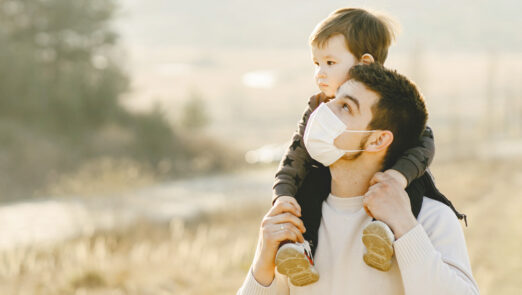Life is returning to normal for families around Victoria as lockdown restrictions are lifted and services resume. However, this return to normality raises some questions amongst parents of young children who might have become accustomed to life in lockdown with the family.
To address this issue, The Royal Children’s Hospital of Melbourne held an online forum with expert paediatricians on how families can help ease their young children and toddlers back into the outside world.
Addressing COVID Concerns
Despite most of Victoria’s population being vaccinated, the COVID virus isn’t going away. However, parents of children under the age of five shouldn’t be too concerned, according to Dr Margie Danchin, paediatrician and vaccination expert.
“For children under the age of five, the COVID illness is, for the most part, just like any other respiratory virus, which can give them a fever, cough, and runny nose,” said Dr Danchin.
“The Delta variant isn’t more severe to children of this age group. Even though severe COVID infections can result in hospitalisation for minor need of oxygen or fluids, few will ever end up in ICU. Even Children that had bronchitis or asthma will not be at high risk.
According to Dr Danchin, children who are more at risk of ending up in ICU from COVID are mostly older, unvaccinated teenagers. Young children with underlying medical conditions such as neuro-development disorders, cerebral palsy, down syndrome or underlying cardiac disease, are also at higher risk of getting adverse COVID symptoms.
Though the science is not settled on the effects of “Long COVID” – chronic lingering symptoms that remain after acute COVID infection – on young children, Dr Danchin says that estimates show that it is uncommon among younger children with studies showing between 2-14% might have lingering symptoms.
Debunking COVID Outbreak Myths
The lifting of restrictions have seen a flurry of reports that link the spread of COVID infections to early learning centres. However, parents can be assured that children are the main vectors of transmissions.
“Based on data from New South Wales, most infections that happen in these centres are from adult staff-to-staff, and staff-to-child, with much less transmission seen between children,” Dr Danchin assured.
According to a report from the Murdoch Children’s Research Institute, the Delta variant infections are mostly spread between adults, less frequently from adult to child, and only rarely between children.
To stem the spread of COVID, early learning centres should adopt the “3V strategy”, which is Vaccination, Ventilation, and Vital COVID-safe steps. “Vaccination” involves getting educators, parents, and carers vaccinated to prevent further transmissions. “Ventilation” greatly reduces the chance of transmissions, with classes and activities to be conducted in well-ventilated rooms or areas, such as outdoors or in rooms with good filtration and ventilation. And finally “Vital COVID-safe steps” involves washing hands often and routine cleaning of the centre.
Easing Young Children into Normal Life
For many young children, the last two years of lockdowns have made them unfamiliar with the outside world. Stepping into society, meeting other people and family members might come as a shock to their system, which is why parents should be there to listen and provide the right support to their children’s experiences.
“Toddler tantrums are a common issue due to toddlers being overwhelmed by new experiences,” said developmental-behavioural paediatrician, Associate Professor Gehan Roberts.
“These tantrums are a response from toddlers who are engaging with a new and confusing world around them. It is a normal behaviour and parents should be constantly role-modeling appropriate behavior and be the stable place the toddler can come back to.”
These tantrums are part of the toddler’s way of communicating and it is to be expected. Roberts recommends that parents should always try to respond to their toddler’s communication and understand the stress that the toddler is undergoing at that point.
For older children, parents should not rush back to their pre-lockdown activities. Instead they should pace themselves and focus on selected things as they ease the family back to normality.
“Make sure the children get plenty of sleep, nutritious meals, and time for unstructured play. Make routines that are simple, repetitive, and predictable, to help them cope with stressful things. Using a visual time table also helps establish a routine,” said Dr Niroshini Kennedy, a developmental-behavioural paediatrician.
As families seek to reconnect, parents should gently introduce people into the child’s circle. With some time and support from parents, children will get used to seeing and knowing other people again.
Returning to Early Learning Centres
Besides meeting people again and interacting with the outside world, returning to Early Learning Centres would also pose a challenge to young children who have grown accustomed to life in lockdown.
According to clinical psychologist, Dr Georgina Cox, there are numerous ways for parents to help and support their children in getting back into an early learning environment. One way is to help see it from their perspective.
“For a child who is entering the early learning environment, it is a new and different experience for them,” said Dr Cox. “As such, preparation is really helpful and parents can help by talking them through what a day in the centre will look like, show them pictures of the early learning centre or take them to the neighbourhood to ease them into the area.”
In addition to that, Dr Cox also recommends that parents get in touch with their child’s early learning centre to help educators understand any of their child’s needs and how they can help ease the children into the centre activities.
At Bright ELC, our educators and staff are fully vaccinated and prepared to help your children get back to socialising with one another, learning about the world around them, and building their character.

